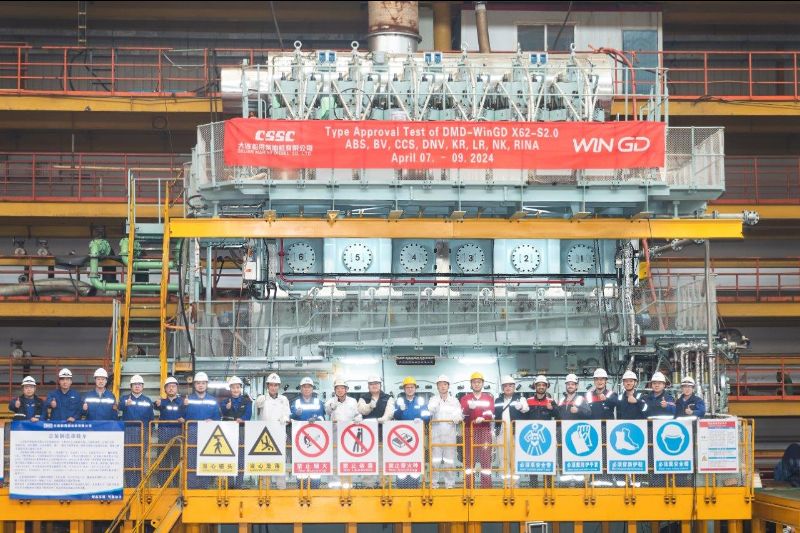
AMP Calls Out Reuters on Latest Jones Act Article
WASHINGTON – The American Maritime Partnership (AMP), the voice of the domestic American maritime industry, released the following statement and fact versus fiction analysis of a recent Reuters article on the Jones Act.
“There is zero pressure on the Jones Act in Congress. In fact, just the opposite — it enjoys rock solid support from both lawmakers and the Administration. Leaders from both sides of the aisle are showing their strong support for this law critical to America’s national and economic security. The domestic maritime industry is flourishing and stronger than ever. The most modern vessels in the world are being built in record numbers in U.S. shipyards all around the country, the industry is responding to the changing energy market caused by the shale oil revolution, and the U.S. maritime industry is growing and employing American workers as a result. It is an exciting time to be a part of this dynamic industry, and the nation is benefiting from the service we provide.”
FICTION: Shipping by Jones Act vessels is three times more expensive than foreign vessels.
FACT CHECK: This is an apples to oranges comparison. U.S.-flag ships operating in domestic trades are subject to all U.S. laws. Foreign flag ships operate in international trades are subject to the lax laws of flag of convenience countries like Liberia and Panama. The suggestion that a foreign flag ship could operate in the domestic trade without being subject to U.S. laws is a farce; it is highly unlikely Congress or the Executive Branch will permit foreign ships to operate in wholly domestic commerce without being subject to U.S. taxation, U.S. immigration, and a host of other U.S. laws.
The Government Accountability Office (GAO) has repeatedly debunked this myth:
• “Foreign carriers operating in the U.S. coastwise trade could be required to comply with other U.S. laws and regulations which could increase foreign carriers’ costs and may affect the rates they could charge.” http://www.gao.gov/assets/660/653046.pdf
FACT CHECK: The nation’s domestic energy production boom has caused costs of transport by rail and pipeline to skyrocket, while transport by maritime has remained not only competitive, but often times more economical.
• Bakken crude rail transport costs: $9/bbl to Cushing [OK]; $11-12/bbl to Eastern Canada;
$12/bbl to St. James [LA]; $17/bbl to U.S. East Coast; $9/bbl to U.S. West Coast. U.S. Gulf Coast to U.S. East Coast by U.S. flagged-vessels — $5-$6/bbl, comparable with U.S. pipeline rates (at $4/bbl). http://www.valero.com/InvestorRelations/Pages/EventsPresentations.aspx
• “We’ve seen dramatic increases in tank car rates over the last 18 months due to the unprecedented demand for the cars.”
http://www.chicagobusiness.com/article/20131026/ISSUE01/310269977/oil-boom-is-creating-years-long-
backlog-for-tank-cars#
• “Apart from the national security argument, some tanker analysts said that the high demand for Jones Act tankers is also supported by better economics and practicality when compared with pipelines.” http://www.cnss.com.cn/html/2014/updates_0516/150508.html
FACT CHECK: Refineries are experiencing record profits by refining cheap domestic crude and selling the gasoline, jet, diesel, and other refined products overseas at better margins.
• “This surge in supply also has lowered costs for refinery operators, simply because domestic crude is less expensive than imported oil. At the same time, Gulf Coast refineries have expanded over the past few years and can increase their volume, keeping prices even lower.” http://oilprice.com/Latest-Energy-News/World-News/Gas-Prices-Dont-Reflect-Record-Levels-Of-U.S.-Refinery-Output.html
• “Refiners are jumping on the opportunity to increase profits…” http://www.nasdaq.com/article/gas-
prices-dont-reflect-record-levels-of-us-refinery-output-cm373817#ixzz3Ax5eqEPO
FACT CHECK: Over the past year, U.S. shipyards have entered into hundreds of contracts for new vessels, including the construction of state of the art tankers and barges to help America meet the growing demand from the nation’s surge in domestic energy production. Last year, the construction of inland tank barges reached an all-time high with 336 new vessels delivered, totaling more than 8.2 million barrels of capacity, and some 19 large tankers and articulated-tank barges with another combined 6.5 million barrels of capacity.
• “U.S. shipyards are the busiest in almost two decades as surging domestic energy production increases cargoes for the merchant fleet, according to the Department of Transportation.” http://www.bloomberg.com/news/2013-09-18/u-s-shipbuilding-is-highest-in-almost-20-years-on-shale-energy.html
• “Outside of pipelines, [maritime] is the best way to transport oil if you’re a coastal refiner.”
http://www.bloomberg.com/news/2014-05-28/birthplace-of-uss-new-jersey-saved-by-shale-production-
freight.html
American Maritime Partnership is the voice of the U.S. domestic maritime industry, a pillar of our nation‘s economic, national, and homeland security. More than 40,000 American vessels built in American shipyards, crewed by American mariners, and owned by American companies, operate in our waters 24/7. This commerce sustains 478,000 American jobs, $28.95 billion in labor compensation, and more than $92.5 billion in annual economic output. For more information, please visit www.americanmaritimepartnership.com

Subscribe for Daily Maritime Insights
Sign up for gCaptain’s newsletter and never miss an update
— trusted by our 109,355 members

Get The Industry’s Go-To News
Subscribe to gCaptain Daily and stay informed with the latest global maritime and offshore news

 Join The Club
Join The Club








